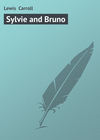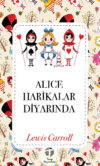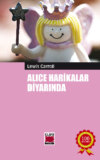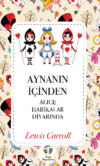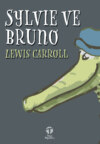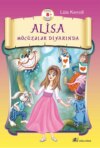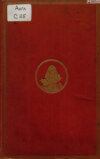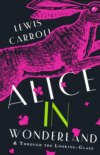Kitabı oku: «Sylvie and Bruno», sayfa 9
There was a little quiver in Sylvie’s voice too, as she whispered “Why, what’s the matter, darling?” and tried to lift up his head and kiss him.
But Bruno only clung to her, sobbing, and wouldn’t be comforted till he had confessed. “I tried — to spoil oor garden — first — but I’ll never — never — ” and then came another burst of tears, which drowned the rest of the sentence. At last he got out the words “I liked — putting in the flowers — for oo, Sylvie — and I never was so happy before.” And the rosy little face came up at last to be kissed, all wet with tears as it was.
Sylvie was crying too by this time, and she said nothing but “Bruno, dear!” and “I never was so happy before,” though why these two children who had never been so happy before should both be crying was a mystery to me.
I felt very happy too, but of course I didn’t cry: “big things” never do, you know we leave all that to the Fairies. Only I think it must have been raining a little just then, for I found a drop or two on my cheeks.
After that they went through the whole garden again, flower by flower, as if it were a long sentence they were spelling out, with kisses for commas, and a great hug by way of a full-stop when they got to the end.
“Doos oo know, that was my river-edge, Sylvie?” Bruno solemnly began.
Sylvie laughed merrily. “What do you mean?” she said. And she pushed back her heavy brown hair with both hands, and looked at him with dancing eyes in which the big teardrops were still glittering.
Bruno drew in a long breath, and made up his mouth for a great effort. “I mean revenge,” he said: “now oo under’tand.” And he looked so happy and proud at having said the word right at last, that I quite envied him. I rather think Sylvie didn’t “under’tand” at all; but she gave him a little kiss on each cheek, which seemed to do just as well.
So they wandered off lovingly together, in among the buttercups, each with an arm twined round the other, whispering and laughing as they went, and never so much as once looked back at poor me. Yes, once, just before I quite lost sight of them, Bruno half turned his head, and nodded me a saucy little good-bye over one shoulder. And that was all the thanks I got for my trouble. The very last thing I saw of them was this — Sylvie was stooping down with her arms round Bruno’s neck, and saying coaxingly in his ear, “Do you know, Bruno, I’ve quite forgotten that hard word. Do say it once more. Come! Only this once, dear!”
But Bruno wouldn’t try it again.
CHAPTER 16. A CHANGED CROCODILE
The Marvellous — the Mysterious — had quite passed out of my life for the moment: and the Common-place reigned supreme. I turned in the direction of the Earl’s house, as it was now ‘the witching hour’ of five, and I knew I should find them ready for a cup of tea and a quiet chat.
Lady Muriel and her father gave me a delightfully warm welcome. They were not of the folk we meet in fashionable drawing-rooms who conceal all such feelings as they may chance to possess beneath the impenetrable mask of a conventional placidity. ‘The Man with the Iron Mask’ was, no doubt, a rarity and a marvel in his own age: in modern London no one would turn his head to give him a second look! No, these were real people. When they looked pleased, it meant that they were pleased: and when Lady Muriel said, with a bright smile, “I’m very glad to see you again!”, I knew that it was true.
Still I did not venture to disobey the injunctions — crazy as I felt them to be — of the lovesick young Doctor, by so much as alluding to his existence: and it was only after they had given me full details of a projected picnic, to which they invited me, that Lady Muriel exclaimed, almost as an after-thought, “and do, if you can, bring Doctor Forester with you! I’m sure a day in the country would do him good. I’m afraid he studies too much — ”
It was ‘on the tip of my tongue’ to quote the words “His only books are woman’s looks!” but I checked myself just in time — with something of the feeling of one who has crossed a street, and has been all but run over by a passing ‘Hansom.’
“ — and I think he has too lonely a life,” she went on, with a gentle earnestness that left no room whatever to suspect a double meaning. “Do get him to come! And don’t forget the day, Tuesday week. We can drive you over. It would be a pity to go by rail — there is so much pretty scenery on the road. And our open carriage just holds four.”
“Oh, I’ll persuade him to come!” I said with confidence — thinking “it would take all my powers of persuasion to keep him away!”
The picnic was to take place in ten days: and though Arthur readily accepted the invitation I brought him, nothing that I could say would induce him to call — either with me or without me on the Earl and his daughter in the meanwhile. No: he feared to “ wear out his welcome,” he said: they had “seen enough of him for one while”: and, when at last the day for the expedition arrived, he was so childishly nervous and uneasy that I thought it best so to arrange our plans that we should go separately to the house — my intention being to arrive some time after him, so as to give him time to get over a meeting.
With this object I purposely made a considerable circuit on my way to the Hall (as we called the Earl’s house): “and if I could only manage to lose my way a bit,” I thought to myself, “that would suit me capitally!”
In this I succeeded better, and sooner, than I had ventured to hope for. The path through the wood had been made familiar to me, by many a solitary stroll, in my former visit to Elveston; and how I could have so suddenly and so entirely lost it — even though I was so engrossed in thinking of Arthur and his lady-love that I heeded little else — was a mystery to me. “And this open place,” I said to myself, “seems to have some memory about it I cannot distinctly recall — surely it is the very spot where I saw those Fairy-Children! But I hope there are no snakes about!” I mused aloud, taking my seat on a fallen tree. “I certainly do not like snakes — and I don’t suppose Bruno likes them, either!”
“No, he doesn’t like them!” said a demure little voice at my side.
“He’s not afraid of them, you know. But he doesn’t like them.
He says they’re too waggly!”
Words fail me to describe the beauty of the little group — couched on a patch of moss, on the trunk of the fallen tree, that met my eager gaze: Sylvie reclining with her elbow buried in the moss, and her rosy cheek resting in the palm of her hand, and Bruno stretched at her feet with his head in her lap.
“Too waggly?” was all I could say in so sudden an emergency.
“I’m not praticular,” Bruno said, carelessly: “but I do like straight animals best — ”
“But you like a dog when it wags its tail, Sylvie interrupted.
“You know you do, Bruno!”
“But there’s more of a dog, isn’t there, Mister Sir?” Bruno appealed to me. “You wouldn’t like to have a dog if it hadn’t got nuffin but a head and a tail?”
I admitted that a dog of that kind would be uninteresting.
“There isn’t such a dog as that,” Sylvie thoughtfully remarked.
“But there would be,” cried Bruno, “if the Professor shortened it up for us!”
“Shortened it up?” I said. “That’s something new. How does he do it?”
“He’s got a curious machine “Sylvie was beginning to explain.
“A welly curious machine,” Bruno broke in, not at all willing to have the story thus taken out of his mouth, “and if oo puts in — some-finoruvver — at one end, oo know and he turns the handle — and it comes out at the uvver end, oh, ever so short!”
“As short as short! “Sylvie echoed.
“And one day when we was in Outland, oo know — before we came to Fairyland me and Sylvie took him a big Crocodile. And he shortened it up for us. And it did look so funny! And it kept looking round, and saying ‘wherever is the rest of me got to?’ And then its eyes looked unhappy — ”
“Not both its eyes,” Sylvie interrupted.
“Course not!” said the little fellow. “Only the eye that couldn’t see wherever the rest of it had got to. But the eye that could see wherever — ”
“How short was the crocodile?” I asked, as the story was getting a little complicated.
“Half as short again as when we caught it — so long,” said Bruno, spreading out his arms to their full stretch.
I tried to calculate what this would come to, but it was too hard for me.
Please make it out for me, dear Child who reads this!
“But you didn’t leave the poor thing so short as that, did you?”
“Well, no. Sylvie and me took it back again and we got it stretched to — to — how much was it, Sylvie?”
“Two times and a half, and a little bit more,” said Sylvie.
“It wouldn’t like that better than the other way, I’m afraid?”
“Oh, but it did though!” Bruno put in eagerly. “It were proud of its new tail! Oo never saw a Crocodile so proud! Why, it could go round and walk on the top of its tail, and along its back, all the way to its head!”
Not quite all the way,” said Sylvie. “It couldn’t, you know.”
“Ah, but it did, once!” Bruno cried triumphantly. “Oo weren’t looking — but I watched it. And it walked on tippiety-toe, so as it wouldn’t wake itself, ‘cause it thought it were asleep. And it got both its paws on its tail. And it walked and it walked all the way along its back. And it walked and it walked on its forehead. And it walked a tiny little way down its nose! There now!”
This was a good deal worse than the last puzzle. Please, dear Child, help again!
“I don’t believe no Crocodile never walked along its own forehead!” Sylvie cried, too much excited by the controversy to limit the number of her negatives.
“Oo don’t know the reason why it did it!’, Bruno scornfully retorted. “It had a welly good reason. I heerd it say ‘Why shouldn’t I walk on my own forehead?’ So a course it did, oo know!”
“If that’s a good reason, Bruno,” I said, “why shouldn’t you get up that tree?”
“Shall, in a minute,” said Bruno: “soon as we’ve done talking. Only two peoples ca’n’t talk comfably togevver, when one’s getting up a tree, and the other isn’t!”
It appeared to me that a conversation would scarcely be ‘comfable’ while trees were being climbed, even if both the ‘peoples’ were doing it: but it was evidently dangerous to oppose any theory of Bruno’s; so I thought it best to let the question drop, and to ask for an account of the machine that made things longer.
This time Bruno was at a loss, and left it to Sylvie.
“It’s like a mangle,” she said: “if things are put in, they get squoze — ”
“Squeezeled!” Bruno interrupted.
“Yes.” Sylvie accepted the correction, but did not attempt to pronounce the word, which was evidently new to her. “They get — like that — and they come out, oh, ever so long!”
“Once,” Bruno began again, “Sylvie and me writed — ”
“Wrote!” Sylvie whispered.
“Well, we wroted a Nursery-Song, and the Professor mangled it longer for us. It were ‘There was a little Man, And he had a little gun, And the bullets — ’”
“I know the rest,” I interrupted. “But would you say it long I mean the way that it came out of the mangle?”
“We’ll get the Professor to sing it for you,” said Sylvie.
“It would spoil it to say it.”
“I would like to meet the Professor,” I said. “And I would like to take you all with me, to see some friends of mine, that live near here. Would you like to come?”
“I don’t think the Professor would like to come,” said Sylvie. “He’s very shy. But we’d like it very much. Only we’d better not come this size, you know.”
The difficulty had occurred to me already: and I had felt that perhaps there would be a slight awkwardness in introducing two such tiny friends into Society. “What size will you be?” I enquired.
“We’d better come as — common children,” Sylvie thoughtfully replied.
“That’s the easiest size to manage.”
“Could you come to-day?” I said, thinking “then we could have you at the picnic!”
Sylvie considered a little. “Not to-day,” she replied. “We haven’t got the things ready. We’ll come on — Tuesday next, if you like. And now, really Bruno, you must come and do your lessons.”
“I wiss oo wouldn’t say ‘really Bruno!’” the little fellow pleaded, with pouting lips that made him look prettier than ever. “It always show’s there’s something horrid coming! And I won’t kiss you, if you’re so unkind.”
“Ah, but you have kissed me!” Sylvie exclaimed in merry triumph.
“Well then, I’ll unkiss you!” And he threw his arms round her neck for this novel, but apparently not very painful, operation.
“It’s very like kissing!” Sylvie remarked, as soon as her lips were again free for speech.
“Oo don’t know nuffin about it! It were just the conkery!” Bruno replied with much severity, as he marched away.
Sylvie turned her laughing face to me. “Shall we come on Tuesday?” she said.
“Very well,” I said: “let it be Tuesday next.
But where is the Professor? Did he come with you to Fairyland?”
“No,” said Sylvie. “But he promised he’d come and see us, some day.
He’s getting his Lecture ready. So he has to stay at home.”
“At home?” I said dreamily, not feeling quite sure what she had said.
“Yes, Sir. His Lordship and Lady Muriel are at home.
Please to walk this way.”
CHAPTER 17. THE THREE BADGERS
Still more dreamily I found myself following this imperious voice into a room where the Earl, his daughter, and Arthur, were seated. “So you’re come at last!” said Lady Muriel, in a tone of playful reproach.
“I was delayed,” I stammered. Though what it was that had delayed me I should have been puzzled to explain! Luckily no questions were asked.
The carriage was ordered round, the hamper, containing our contribution to the Picnic, was duly stowed away, and we set forth.
There was no need for me to maintain the conversation. Lady Muriel and Arthur were evidently on those most delightful of terms, where one has no need to check thought after thought, as it rises to the lips, with the fear ‘this will not be appreciated — this will give’ offence — this will sound too serious — this will sound flippant’: like very old friends, in fullest sympathy, their talk rippled on.
“Why shouldn’t we desert the Picnic and go in some other direction?” she suddenly suggested. “A party of four is surely self-sufficing? And as for food, our hamper — ”
“Why shouldn’t we? What a genuine lady’s argument!” laughed Arthur. “A lady never knows on which side the onus probandi — the burden of proving — lies!”
“Do men always know?” she asked with a pretty assumption of meek docility.
“With one exception — the only one I can think of Dr. Watts, who has asked the senseless question
‘Why should I deprive my neighbour
Of his goods against his will?’
Fancy that as an argument for Honesty! His position seems to be ‘I’m only honest because I see no reason to steal.’ And the thief’s answer is of course complete and crushing. ‘I deprive my neighbour of his goods because I want them myself. And I do it against his will because there’s no chance of getting him to consent to it!’”
“I can give you one other exception,” I said: “an argument I heard only to-day — and not by a lady. ‘Why shouldn’t I walk on my own forehead?’”
“What a curious subject for speculation!” said Lady Muriel, turning to me, with eyes brimming over with laughter. “May we know who propounded the question? And did he walk on his own forehead?”
“I ca’n’t remember who it was that said it!” I faltered. “Nor where I heard it!”
“Whoever it was, I hope we shall meet him at the Picnic!” said Lady Muriel.
“It’s a far more interesting question than ‘Isn’t this a picturesque ruin?’
Aren’t those autumn-tints lovely?’ I shall have to answer those two questions ten times, at least, this afternoon!”
“That’s one of the miseries of Society!” said Arthur. “Why ca’n’t people let one enjoy the beauties of Nature without having to say so every minute? Why should Life be one long Catechism?”
“It’s just as bad at a picture-gallery,” the Earl remarked. “I went to the R.A. last May, with a conceited young artist: and he did torment me! I wouldn’t have minded his criticizing the pictures himself: but I had to agree with him — or else to argue the point, which would have been worse!”
“It was depreciatory criticism, of course?” said Arthur.
“I don’t see the ‘of course’ at all.”
“Why, did you ever know a conceited man dare to praise a picture? The one thing he dreads (next to not being noticed) is to be proved fallible! If you once praise a picture, your character for infallibility hangs by a thread. Suppose it’s a figure-picture, and you venture to say ‘draws well.’ Somebody measures it, and finds one of the proportions an eighth of an inch wrong. You are disposed of as a critic! ‘Did you say he draws well?’ your friends enquire sarcastically, while you hang your head and blush. No. The only safe course, if any one says ‘draws well,’ is to shrug your shoulders. ‘Draws well?’ you repeat thoughtfully. ‘Draws well? Humph!’ That’s the way to become a great critic!”
Thus airily chatting, after a pleasant drive through a few miles of beautiful scenery, we reached the rendezvous — a ruined castle — where the rest of the picnic-party were already assembled. We spent an hour or two in sauntering about the ruins: gathering at last, by common consent, into a few random groups, seated on the side of a mound, which commanded a good view of the old castle and its surroundings.
The momentary silence, that ensued, was promptly taken possession of or, more correctly, taken into custody — by a Voice; a voice so smooth, so monotonous, so sonorous, that one felt, with a shudder, that any other conversation was precluded, and that, unless some desperate remedy were adopted, we were fated to listen to a Lecture, of which no man could foresee the end!
The speaker was a broadly-built man, whose large, flat, pale face was bounded on the North by a fringe of hair, on the East and West by a fringe of whisker, and on the South by a fringe of beard — the whole constituting a uniform halo of stubbly whitey-brown bristles. His features were so entirely destitute of expression that I could not help saying to myself — helplessly, as if in the clutches of a night-mare — “they are only penciled in: no final touches as yet!” And he had a way of ending every sentence with a sudden smile, which spread like a ripple over that vast blank surface, and was gone in a moment, leaving behind it such absolute solemnity that I felt impelled to murmur “it was not he: it was somebody else that smiled!”
“Do you observe?” (such was the phrase with which the wretch began each sentence) “Do you observe the way in which that broken arch, at the very top of the ruin, stands out against the clear sky? It is placed exactly right: and there is exactly enough of it. A little more, or a little less, and all would be utterly spoiled!”
“Oh gifted architect!” murmured Arthur, inaudibly to all but Lady Muriel and myself. “Foreseeing the exact effect his work would have, when in ruins, centuries after his death!”
“And do you observe, where those trees slope down the hill, (indicating them with a sweep of the hand, and with all the patronising air of the man who has himself arranged the landscape), “how the mists rising from the river fill up exactly those intervals where we need indistinctness, for artistic effect? Here, in the foreground, a few clear touches are not amiss: but a back-ground without mist, you know! It is simply barbarous! Yes, we need indistinctness!”
The orator looked so pointedly at me as he uttered these words, that I felt bound to reply, by murmuring something to the effect that I hardly felt the need myself — and that I enjoyed looking at a thing, better, when I could see it.
“Quite so!” the great man sharply took me up. “From your point of view, that is correctly put. But for anyone who has a soul for Art, such a view is preposterous. Nature is one thing. Art is another. Nature shows us the world as it is. But Art — as a Latin author tells us — Art, you know the words have escaped my memory “Ars est celare Naturam,” Arthur interposed with a delightful promptitude.
“Quite so!” the orator replied with an air of relief. “I thank you! Ars est celare Naturam but that isn’t it.” And, for a few peaceful moments, the orator brooded, frowningly, over the quotation. The welcome opportunity was seized, and another voice struck into the silence.
“What a lovely old ruin it is!” cried a young lady in spectacles, the very embodiment of the March of Mind, looking at Lady Muriel, as the proper recipient of all really original remarks. “And don’t you admire those autumn-tints on the trees? I do, intensely!”
Lady Muriel shot a meaning glance at me; but replied with admirable gravity. “Oh yes indeed, indeed! So true!”
“And isn’t strange, said the young lady, passing with startling suddenness from Sentiment to Science, “that the mere impact of certain coloured rays upon the Retina should give us such exquisite pleasure?”
“You have studied Physiology, then?” a certain young Doctor courteously enquired.
“Oh, yes! Isn’t it a sweet Science?”
Arthur slightly smiled. “It seems a paradox, does it not,” he went on, “that the image formed on the Retina should be inverted?”
“It is puzzling,” she candidly admitted. “Why is it we do not see things upside-down?”
“You have never heard the Theory, then, that the Brain also is inverted?”
“No indeed! What a beautiful fact! But how is it proved?”
“Thus,” replied Arthur, with all the gravity of ten Professors rolled into one. “What we call the vertex of the Brain is really its base: and what we call its base is really its vertex: it is simply a question of nomenclature.”
This last polysyllable settled the matter.
“How truly delightful!” the fair Scientist exclaimed with enthusiasm. “I shall ask our Physiological Lecturer why he never gave us that exquisite Theory!”
“I’d give something to be present when the question is asked!” Arthur whispered to me, as, at a signal from Lady Muriel, we moved on to where the hampers had been collected, and devoted ourselves to the more substantial business of the day.
We ‘waited’ on ourselves, as the modern barbarism (combining two good things in such a way as to secure the discomforts of both and the advantages of neither) of having a picnic with servants to wait upon you, had not yet reached this out-of-the-way region — and of course the gentlemen did not even take their places until the ladies had been duly provided with all imaginable creature-comforts. Then I supplied myself with a plate of something solid and a glass of something fluid, and found a place next to Lady Muriel.
It had been left vacant — apparently for Arthur, as a distinguished stranger: but he had turned shy, and had placed himself next to the young lady in spectacles, whose high rasping voice had already cast loose upon Society such ominous phrases as “Man is a bundle of Qualities!”, “the Objective is only attainable through the Subjective!”. Arthur was bearing it bravely: but several faces wore a look of alarm, and I thought it high time to start some less metaphysical topic.
“In my nursery days,” I began, “when the weather didn’t suit for an out-of-doors picnic, we were allowed to have a peculiar kind, that we enjoyed hugely. The table cloth was laid under the table, instead of upon it: we sat round it on the floor: and I believe we really enjoyed that extremely uncomfortable kind of dinner more than we ever did the orthodox arrangement!”
“I’ve no doubt of it,” Lady Muriel replied.
“There’s nothing a well-regulated child hates so much as regularity. I believe a really healthy boy would thoroughly enjoy Greek Grammar — if only he might stand on his head to learn it! And your carpet-dinner certainly spared you one feature of a picnic, which is to me its chief drawback.”
“The chance of a shower?” I suggested.
“No, the chance — or rather the certainty of live things occurring in combination with one’s food! Spiders are my bugbear. Now my father has no sympathy with that sentiment — have you, dear?” For the Earl had caught the word and turned to listen.
“To each his sufferings, all are men,” he replied in the sweet sad tones that seemed natural to him: “each has his pet aversion.”
“But you’ll never guess his!” Lady Muriel said, with that delicate silvery laugh that was music to my ears.
I declined to attempt the impossible.
“He doesn’t like snakes!” she said, in a stage whisper. “Now, isn’t that an unreasonable aversion? Fancy not liking such a dear, coaxingly, clingingly affectionate creature as a snake!”
“Not like snakes!” I exclaimed. “Is such a thing possible?”
“No, he doesn’t like them,” she repeated with a pretty mock-gravity.
“He’s not afraid of them, you know. But he doesn’t like them.
He says they’re too waggly!”
I was more startled than I liked to show. There was something so uncanny in this echo of the very words I had so lately heard from that little forest-sprite, that it was only by a great effort I succeeded in saying, carelessly, “Let us banish so unpleasant a topic. Won’t you sing us something, Lady Muriel? I know you do sing without music.”
“The only songs I know — without music — are desperately sentimental,
I’m afraid! Are your tears all ready?”
“Quite ready! Quite ready!” came from all sides, and Lady Muriel — not being one of those lady-singers who think it de rigueur to decline to sing till they have been petitioned three or four times, and have pleaded failure of memory, loss of voice, and other conclusive reasons for silence — began at once:
“There be three Badgers on a mossy stone,
Beside a dark and covered way:
Each dreams himself a monarch on his throne,
And so they stay and stay
Though their old Father languishes alone,
They stay, and stay, and stay.
“There be three Herrings loitering around,
Longing to share that mossy seat:
Each Herring tries to sing what she has found
That makes Life seem so sweet.
Thus, with a grating and uncertain sound,
They bleat, and bleat, and bleat,
“The Mother-Herring, on the salt sea-wave,
Sought vainly for her absent ones:
The Father-Badger, writhing in a cave,
Shrieked out ‘ Return, my sons!
You shalt have buns,’ he shrieked,’ if you’ll behave!
Yea, buns, and buns, and buns!’
“’I fear,’ said she, ‘your sons have gone astray?
My daughters left me while I slept.’
‘Yes ‘m,’ the Badger said: ‘it’s as you say.’
‘They should be better kept.’
Thus the poor parents talked the time away,
And wept, and wept, and wept.”
Here Bruno broke off suddenly. “The Herrings’ Song wants anuvver tune,
Sylvie,” he said. “And I ca’n’t sing it not wizout oo plays it for me!”
Instantly Sylvie seated herself upon a tiny mushroom, that happened to grow in front of a daisy, as if it were the most ordinary musical instrument in the world, and played on the petals as if they were the notes of an organ. And such delicious tiny music it was! Such teeny-tiny music!
Bruno held his head on one side, and listened very gravely for a few moments until he had caught the melody. Then the sweet childish voice rang out once more: —
“Oh, dear beyond our dearest dreams,
Fairer than all that fairest seems!
To feast the rosy hours away,
To revel in a roundelay!
How blest would be
A life so free —
Ipwergis-Pudding to consume,
And drink the subtle Azzigoom!
“And if in other days and hours,
Mid other fluffs and other flowers,
The choice were given me how to dine —
‘Name what thou wilt: it shalt be thine!’
Oh, then I see
The life for me
Ipwergis-Pudding to consume,
And drink the subtle Azzigoom!”
“Oo may leave off playing now, Sylvie. I can do the uvver tune much better wizout a compliment.”
“He means ‘without accompaniment,’” Sylvie whispered, smiling at my puzzled look: and she pretended to shut up the stops of the organ.
“The Badgers did not care to talk to Fish:
They did not dote on Herrings’ songs:
They never had experienced the dish
To which that name belongs:
And oh, to pinch their tails,’ (this was their wish,)
‘With tongs, yea, tongs, and tongs!’”
I ought to mention that he marked the parenthesis, in the air, with his finger. It seemed to me a very good plan. You know there’s no sound to represent it — any more than there is for a question.
Suppose you have said to your friend “You are better to-day,” and that you want him to understand that you are asking him a question, what can be simpler than just to make a “?”. in the air with your finger? He would understand you in a moment!
“’And are not these the Fish,’ the Eldest sighed,
‘Whose Mother dwells beneath the foam’
‘They are the Fish!’ the Second one replied.
‘And they have left their home!’
‘Oh wicked Fish,’ the Youngest Badger cried,
‘To roam, yea, roam, and roam!’
“Gently the Badgers trotted to the shore
The sandy shore that fringed the bay:
Each in his mouth a living Herring bore —
Those aged ones waxed gay:
Clear rang their voices through the ocean’s roar,
‘Hooray, hooray, hooray!’”
“So they all got safe home again,” Bruno said, after waiting a minute to see if I had anything to say: he evidently felt that some remark ought to be made. And I couldn’t help wishing there were some such rule in Society, at the conclusion of a song — that the singer herself should say the right thing, and not leave it to the audience. Suppose a young lady has just been warbling (‘with a grating and uncertain sound’) Shelley’s exquisite lyric ‘I arise from dreams of thee’: how much nicer it would be, instead of your having to say “Oh, thank you, thank you!” for the young lady herself to remark, as she draws on her gloves, while the impassioned words ‘Oh, press it to thine own, or it will break at last!’ are still ringing in your ears, “ — but she wouldn’t do it, you know. So it did break at last.”
